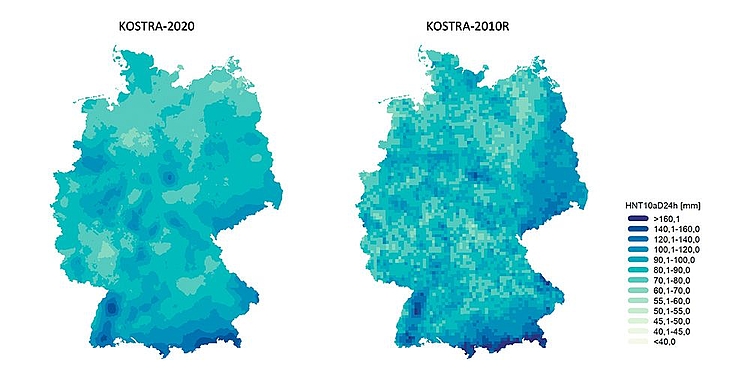Investigating Different Methods for Revising and Updating the Heavy Rainfall Statistics in Germany (MUNSTAR)

| Led by: | Prof. Dr.-Ing. Uwe Haberlandt |
| Team: | Dr.-Ing. Bora Shehu, M.Sc. Luisa Thiele |
| Year: | 2018 |
| Funding: | Ministry of Agriculture and Environment Mecklenburg-Vorpommern. Federal State Funding Programme "Water, Soil and Waste” |
| Duration: | 2018-2022 |
Heavy precipitation volumes at varying duration and frequencies are required for the design of water management systems and facilities - of dams or dikes, spillways, flood retention basins, stormwater overflows of sewage treatment plants, urban drainage systems, etc., but also for the preparation of overload and flooding verifications. The knowledge of area-specific heavy precipitation volumes is thus an essential prerequisite for technically and economically optimised planning. Last but not least, they are a basis and part of the strategy for effective heavy rainfall risk management. Since the 1980s, the Coordinated Heavy Rainfall Regionalisation Evaluation KOSTRA-DWD (Bartels et al., 1997; Malitz, 2005) from the German Weather Service has been providing these design precipitation volumes for different application purposes in Germany. In order to account current requirements, new data and methods, a revision and further development of KOSTRA-DWD should urgently take place (Haberlandt, 2016).
The aim of the project is to conduct methodological studies on the revision and continuation of KOSTRA. In detail, the aim is:
- a) to employ and profit from internationally established and practicable methods for the determination of area-wide design precipitation in Germany,
- b) to include previously unused data (including weather radar and data from other measurement networks) in order to increase the reliability of the results,
- c) to account for the stationarity or instationarity of the data series investigated and see these effects on the extreme value statistics,
- d) to conclude on a concrete proposal for an improved methodology for the regionalisation of heavy precipitation volumes in Germany,
- e) to use the selected methodology to generate design precipitation and illustrate them with example maps. In a follow-up project, the German Weather Service will then produce a new KOSTRA on the basis of the results obtained from this project.
The MUNSTAR project is a cooperation between the German Weather Service (DWD), the Leibniz University of Hannover and the Bureau for Engineering Hydrology, Applied Water Management and Geoinformatics (IAWG). The constellation between authority, university and engineering office was deliberately chosen in order to be able to guarantee scientific expertise, practical questions and the final meteorological support.
